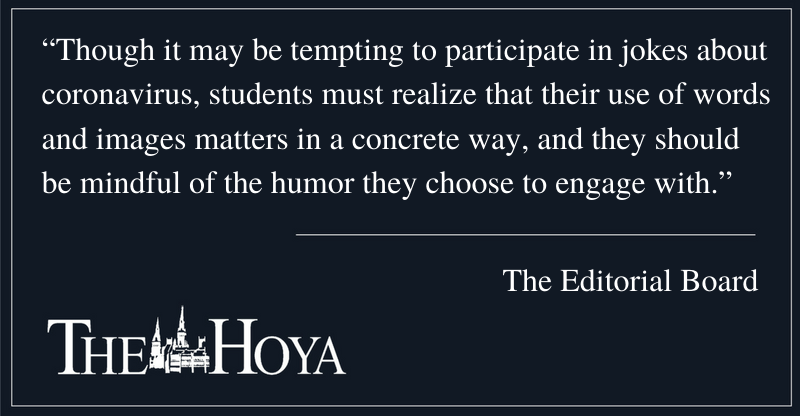While coronavirus has tragically affected many people in China, the United States has seen a problematic trend of jokes and internet memes making light of the outbreak and exacerbating a wave of racism and xenophobia targeting Chinese and East Asian people. China is experiencing a public health crisis, but for many people in the United States, the virus is nothing more than a punch line.
At Georgetown University, racism against East Asian people already occurred before the outbreak began. The university is not immune to the current worldwide increase in offensive anti-Asian rhetoric. Though it may be tempting to participate in jokes about the virus, students must realize that their use of words and images matters in a concrete way, and they should be mindful of the humor they choose to engage with.
Offensive rhetoric targeting East Asians in offhand comments, posts or even likes on social media can have real consequences. Online hate speech furthers racist and xenophobic narratives, and prejudice experienced online can lead to increased anxiety and symptoms of depression for marginalized people, according to a study from researchers at Sheffield Hallam University.
Racist rhetoric targeting East Asian people already exists at Georgetown. Jenny Xu (COL ’21) has experienced such racism through comments that are intended to be humorous. Xu often must navigate situations in which friends make racist jokes about China and Chinese Americans, she wrote in an email to The Hoya. (Full disclosure: Xu previously served on The Hoya’s editorial board.)
While Brian Zhu (SFS ’23) has not experienced direct racism at Georgetown, he has also heard students make ignorant comments about East Asian history and Chinese culture.
“People need to [be] more aware of the underlying biases that influence the memes they choose to create and share, because they can be deeply offensive,” Zhu wrote in a message to The Hoya.
Xu agreed that students must be aware of the underlying messages in content they engage with. “Of course, humor is something that inherently plays with the taboo, but there are times when it blends into reality. That’s when it goes too far, and that’s when we must take seriously the concerns of marginalized people themselves,” Xu wrote.
Since racist and ignorant comments about East Asian people already occur regularly at Georgetown and coronavirus has triggered a spike in such rhetoric on the internet, students should be mindful about their humor and avoid furthering racism and xenophobia through coronavirus memes.
Memes about serious situations are not inherently offensive; Asian teens have been responding to racist coronavirus memes with their own jokes on TikTok. While memes targeting and othering a community are problematic, memes coming from within the community experiencing a difficult situation can be an acceptable and even valuable coping mechanism. But students should avoid engaging with jokes that mock or disparage members of a community they are not a part of.
Georgetown students may not be aware of when their humor is offensive to others, but ignorance does not excuse hateful rhetoric. If students are unsure whether a topic is offensive, they should avoid it. Since hateful speech can cause real harm to the people it targets, including members of the Georgetown community, students have a responsibility to consider the impact their jokes can have before making them.
Students can easily engage with internet culture without resorting to offensive memes. Students do not have to stop making jokes, but they should avoid jokes about coronavirus, which are rooted in ignorance, racism and xenophobia. The memes students choose to engage with can have real effects on others — so it is important to choose wisely.
The Hoya’s editorial board is composed of six students and chaired by the opinion editor. Editorials reflect only the beliefs of a majority of the board and are not representative of The Hoya or any individual member of the board.















Joshua Durdin • Mar 4, 2020 at 11:37 am
I Feel Like Me And My Family ARe THE ONLY PEOPLE Who Take This Seriously.